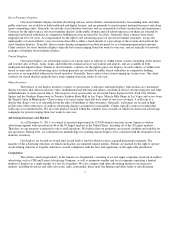iHeartMedia 2011 Annual Report Download - page 20
Download and view the complete annual report
Please find page 20 of the 2011 iHeartMedia annual report below. You can navigate through the pages in the report by either clicking on the pages listed below, or by using the keyword search tool below to find specific information within the annual report.
N
ew technologies may increase competition with our broadcasting operations
Our terrestrial radio broadcasting operations face increasing competition from new technologies, such as broadband
wireless, satellite radio, audio broadcasting by cable television systems and Internet-based audio music services, as well as new
consumer products, such as portable digital audio players, smart mobile phones and other mobile applications. These new
technologies and alternative media platforms, including the new technologies and media platforms used by us, compete with our radio
stations for audience share and advertising revenues. We are unable to predict the effect that such technologies and related services
and products will have on our broadcasting operations, but the capital expenditures necessary to implement these or other new
technologies could be substantial. We cannot assure you that we will continue to have the resources to acquire new technologies or to
introduce new services to compete with other new technologies or services, or that our investments in new technologies or services
will provide the desired returns. Other companies employing such new technologies or services could more successfully implement
such new technologies or services or otherwise increase competition with our businesses.
Our business is dependent upon the performance of on-air talent and program hosts
We employ or independently contract with many on-air personalities and hosts of syndicated radio programs with
significant loyal audiences in their respective markets. Although we have entered into long-term agreements with some of our key on-
air talent and program hosts to protect our interests in those relationships, we can give no assurance that all or any of these persons
will remain with us or will retain their audiences. Competition for these individuals is intense and many of these individuals are under
no legal obligation to remain with us. Our competitors may choose to extend offers to any of these individuals on terms which we
may be unwilling to meet. Furthermore, the popularity and audience loyalty of our key on-air talent and program hosts is highly
sensitive to rapidly changing public tastes. A loss of such popularity or audience loyalty is beyond our control and could have a
material adverse effect on our ability to attract local and/or national advertisers and on our revenue and/or ratings, and could result in
increased expenses.
Our business is dependent on our management team and other key individuals
Our business is dependent upon the performance of our management team and other key individuals. A number of key
individuals have joined us over the past two years, including Robert W. Pittman, who became our Chief Executive Officer on
October 2, 2011. Although we have entered into agreements with some members of our management team and certain other key
individuals, we can give no assurance that all or any of our management team and other key individuals will remain with us.
Competition for these individuals is intense and many of our key employees are at-will employees who are under no legal obligation
to remain with us, and may decide to leave for a variety of personal or other reasons beyond our control. If members of our
management or key individuals decide to leave us in the future, or if we are not successful in attracting, motivating and retaining other
key employees, our business could be adversely affected.
E
xtensive current government regulation, and future regulation, may limit our radio broadcasting and other media and
entertainment operations or adversely affect our business and financial results
Congress and several federal agencies, including the FCC, extensively regulate the domestic radio industry. For example,
the FCC could impact our profitability by imposing large fines on us if, in response to pending complaints, it finds that we broadcast
indecent programming. Additionally, we cannot be sure that the FCC will approve renewal of the licenses we must have in order to
operate our stations. Nor can we be assured that our licenses will be renewed without conditions and for a full term. The non-renewal,
or conditioned renewal, of a substantial number of our FCC licenses, could have a materially adverse impact on our operations.
Furthermore, possible changes in interference protections, spectrum allocations and other technical rules may negatively affect the
operation of our stations. For example, in January 2011 a law that eliminates certain minimum distance separation requirements
between full-power and low-power FM radio stations was enacted, which could lead to increased interference between our stations
and low-power FM stations. In March 2011 the FCC adopted policies which, in certain circumstances, could make it more difficult
for radio stations to relocate to increase their population coverage. In addition, Congress, the FCC and other regulatory agencies have
considered, and may in the future consider and adopt, new laws, regulations and policies that could, directly or indirectly, have an
adverse effect on our business operations and financial performance. In particular, Congress is considering legislation that would
impose an obligation upon all U.S. broadcasters to pay performing artists a royalty for use of their sound recordings (this would be in
addition to payments already made by broadcasters to owners of musical work rights, such as songwriters, composers and publishers).
We cannot predict whether this or other
17
























